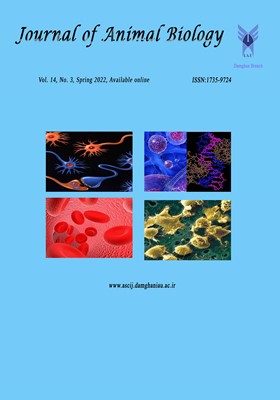Evaluation of the Effect of Alpha-pinene on Blood Glucose and Lipid Profiles, in Diabetic Rats
Subject Areas : Journal of Animal Biology
Maryam Rafieirad
1
![]() ,
Abdolhassan Doulah
2
,
Samira Goudarzi
3
,
Abdolhassan Doulah
2
,
Samira Goudarzi
3
1 - Department of Biology, Islamic Azad University, Izeh Branch, Izeh, Iran
2 - Department of Biology, Islamic Azad University, Ahvaz Branch, Ahvaz, Iran
3 - Department of Biology, Islamic Azad University, Izeh Branch, Izeh, Iran
Keywords: glucose, Rat, Lipid profile, Diabetes, Alpha-pinene,
Abstract :
Diabetes mellitus refers to a disorder in the metabolism of sugars, fats, and proteins in the body, leading to hyperglycemia and hyperlipidemia. The present study was aimed at evaluating the effect of alpha-pinene on blood glucose and lipid levels in male diabetic rats. Forty male rats were divided into five groups of eight: control group, diabetic group, diabetic control group (receiving tween (80% alpha-solvent)) and experimental groups that in addition to becoming diabetic, the doses of 100 and 200 (mg/kg) of alpha-pinene were administered orally and daily for 14 days, respectively. Finally, blood samples were taken from all groups and their glucose and blood lipids were measured. The results were analyzed using analysis of variance (ANOVA) and SPSS21 software. The levels of glucose, triglyceride (TG) and total cholesterol and very low density lipoprotein (VLDL) and low density lipoprotein (LDL) in the groups receiving doses of 100 and 200 mg/kg of alpha-pinene showed a significant decrease compared to the diabetic group. High density lipoprotein (HDL) in the groups receiving different doses of alpha-pinene showed a significant increase compared to the diabetic group. These results indicate that alpha-pinene can be effective in the treatment of diabetes. The effect of this active ingredient is probably due to its antioxidant properties.
5. Goudarzi S., Rafieirad M. 2017. Evaluating the effect of α-pinene on motor activity, avoidance memory and lipid peroxidation in animal model of Parkinson disease in adult male rats. Research Journal of Pharmacognosy, 4(2): 53-63.
7. Hanefi O. 2017. Anti-inflammatory and Hypoglycemic Activities of Alpha-pinene. Acta Pharmaceutica Sinica B, 55(4): 7-14.
20. Rafieian-Kopaei M., Shahinfard N., Rouhi-Boroujeni H., Gharipour M., Darvishzadeh-Boroujeni P. 2014. Effects of Fe rulago angulata extract on serum lipids and lipid per oxidation. Evidence-Based Complementary and Alternative Medicine, 2014: 680856.
21. Rafieirad M., Eydipour Z., Alami Rostami S. 2018. Effects of antidepressants Hydro-alcoholic extract of Chevilan (Ferulago angulate) in model of ischemia/ hypoperfusion in adult male rats. Nova Biologica Reperta (NBR), 5(2): 137-143. [in Persian] link
28. Shi F., Zhao Y., Firempong C.K., Xu X. 2016. Preparation, characterization and pharmacokinetic studies of linalool-loaded nanostructured lipid carriers. Pharm. Biol, 54: 2320–2328.
37. Wang J., Hua W., Yue Y., Gao Z. 2010. MSU-S mesoporous materials: An efficient catalyst for isomerization of α-pinene. Bioresource. Technology, 101, :7224-7230.
38. Wang W., Li N., Luo M., Zu Y., Efferth, T.2012. Antibacterial activity and anticancer activity of Rosmarinus officinalis L. essential oil compared to that of its main components. Molecules, 17: 2704-2713.
_||_


